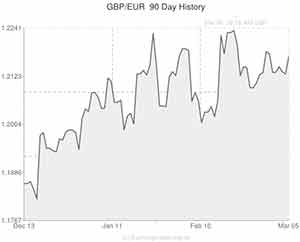
The Pound to Euro exchange rate (GBP/EUR) rallied by around 0.4 cents yesterday as markets prepared for this morning’s statement from the European Central Bank.
The ECB is expected to maintain its current record low benchmark interest rate of 0.25% and refrain from taking the deposit rate down into negative territory. However, if the Bank were to reduce either of these rates then the single currency would likely suffer heavy losses.
With Eurozone CPI inflation floundering below 1.0%, which in itself is only half of the ECB’s 2.0% target, policymakers have become increasingly concerned that the currency bloc could be headed for a deflationary spiral.
Economies depend on consumer spending to grow, even to just stay afloat. However, if inflation falls below 0.0% then it will put considerable pressure on economic output in the Eurozone. This is because consumers are far less inclined to make purchases in an environment where the price of a product is likely to be noticeably cheaper in a few months time. This deflationary spiral of weak consumer spending and postponed purchases wreaked havoc in Japan for a decade; the ECB is acutely aware that it must not let a similar situation develop in the 18-nation bloc.
Reducing the headline rate again could prematurely deplete the ECB of its final traditional monetary policy bullet, and the efficacy of negative deposit rates boosting lending is murky at best.
For this reason the ECB is much more likely to introduce another, non-standard, form of monetary easing. An unnamed source from the Bank indicated yesterday that the Governing Council is set to end the ‘sterilization’ of its Securities Markets Programme (SMP).
The SMP is a policy that the Bank rolled out back in 2010 involving purchases of struggling Eurozone sovereign bonds. In order to keep the money supply from inflating the ECB then removes an equal amount of money from the system by purchasing weaker assets from banks on a weekly basis. This process is known as sterilization.
If the ECB were to announce an end to this sterilization process then it would boost liquidity in the Eurozone by around €175 billion in just over a week.
This €175 billion boost would, hopefully, encourage banks to lend at lower rates, which in turn could help funnel money into the real economy and drive prices higher. Another side effect would be a weakening of the Euro exchange rate due to the increase in the money supply.
It is entirely possible that the Pound to Euro exchange rate (GBP/EUR) could rally towards a fresh yearly high of 1.2258 if the ECB does decide to unleash the €175 billion bazooka into the Eurozone banking system.
The Bank of England, on the other hand, is widely expected to maintain its benchmark interest rate of 0.50% and make no changes to its quantitative easing target of £375 billion. The BoE decision is unlikely to have an impact on Sterling trading unless Governor Mark Carney releases an accompanying statement.

Comments are closed.